Marinated Roasted Red Peppers Canning Recipe
This post may contain affiliate links, which means that I may receive a commission if you make a purchase using these links. As an Amazon Associate I earn from qualifying purchases.
This is a close variation to the classic Italian roasted red peppers in a jar that is safe for home canning. Ripe sweet red peppers are roasted, and preserved in a red wine vinegar olive oil marinade flavored with lemon juice, garlic, and oregano.
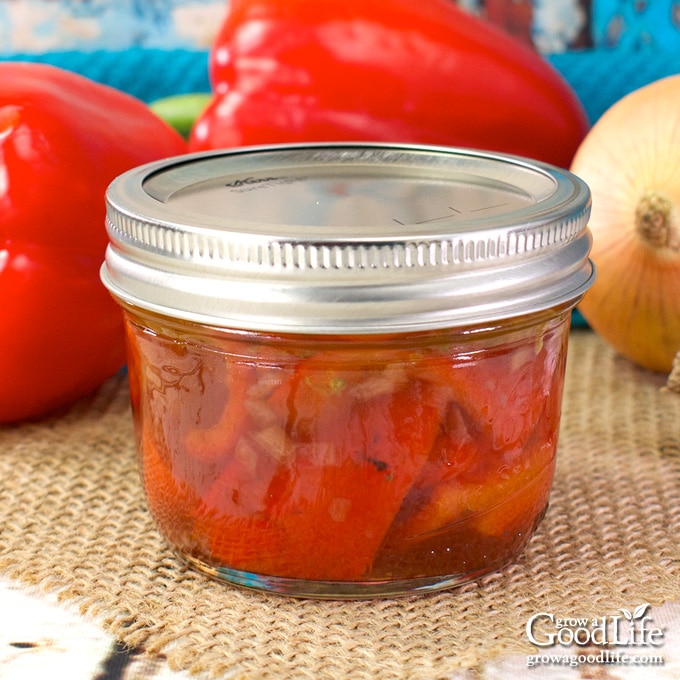
Roasting gives these peppers a nice smoky flavor and sweetness by caramelizing the natural sugars in the fruit.
Roasted red peppers can be used in so many ways. Layer them on burgers and sandwiches, toss with your favorite pasta, and add to salads. You can also thread them onto toothpicks and include on an antipasto platter.
Tips for Making Roasted Red Peppers in a Jar
In this recipe, the marinade is actually a flavorful pickling brine. Pickling the peppers adjusts the acidity, making this recipe safe for preserving in a boiling water canner.
If you prefer to can plain roasted red peppers, you will need to use a pressure canner, and follow this recipe instead: How to Can Chile Peppers. Simply swap out the green chile peppers with red bell peppers.
You Can Use Any Type of Pepper
Select fresh, bright colored, and firm peppers with no blemishes, soft spots, or bruises. Plan on about 4 pounds of peppers to fill 8 half-pint jars or 4 pint sized jars.
This recipe uses sweet red bell peppers, but you can safely replace the peppers with the same amount of another variety. I grow lots of peppers in the garden, and my favorites for this recipe are sweet bells and Italian frying peppers such as Carmen, Marconi, and Corno di Toro.
Feel free to use all sweet red, yellow, or green bell peppers, or spice it up by combining mild and hot peppers:
- For sweet style: Use 4 pounds sweet and mild peppers.
- For mild style: Use 3 pounds sweet and mild peppers, and 1 pound hot peppers.
- For medium style: Use 2 pounds sweet and mild peppers, and 2 pounds hot peppers.
- For hot style: Use 4 pounds hot peppers.
Use Red Wine Vinegar
Vinegar is required in this pickled pepper recipe because it provides the acidity to make it safe for water bath canning. The original recipe calls for white vinegar, but you can swap the type of vinegar used in canning recipes as long as the acidity is 5%.
We found white vinegar added too much bite to the marinated peppers. Apple cider vinegar was mellower, but was still too tart. Red wine vinegar gives this recipe more of the flavor you expect with marinated roasted peppers.
Red wine vinegar is made from fermented red wine. It’s fruity but with a vibrant bite that pairs well with the roasted bell peppers. Be sure to use a red wine vinegar that is at least 5% acidity.
Use Bottled Lemon Juice
The lemon juice adds flavor and probably also contributes to the acidity of this recipe to make it safe for canning. Use commercially bottled lemon juice. Don’t use freshly squeezed lemon juice because the acidity level varies and there is a chance of contaminating the juice from bacteria on the rind.
Follow the Recipe
When canning pickled peppers, it is important to use a recipe that has been scientifically tested. This recipe is the “Marinated Peppers (Bell, Hungarian, Bananas, Jalapeno)” from the USDA Complete Guide to Home Canning, So Easy to Preserve books, and the NCHFP website.
We added a little sugar to soften the vinegar bite. Feel free to swap out the dried herbs as flavorings, but keep the proportions of the ingredients the same to ensure the proper chemistry to can your peppers safely.
How to Can Marinated Red Bell Peppers
In this recipe, peppers are roasted until they are soft, covered in a vinegar and oil based marinade, and preserved in shelf-stable jars using a water bath canner.
If this is your first time canning, or if you haven’t canned in a while, it may be helpful to review this article on water bath canning at the National Center for Home Food Preservation website.
A more detailed and printable recipe can be found at the bottom of this article, but these are the general steps for making and home canning roasted red peppers:
Step 1: Prepare the Canning Equipment
Gather your canning and kitchen equipment, prepare the jars, setup the canner, and organize your work area.
You’ll need:
- Water bath canner with canning rack
- 8 half-pint or 4 pint sized canning jars
- Canning lids and bands (new lids for each jar, bands can be reused)
- Canning tools: jar lifter, canning ladle, funnel, and bubble popper
- Kitchen scale
- Gloves (if you are working with hot peppers)
- Plus basic kitchen supplies such as large rimmed baking sheet, parchment paper, large prep bowls, knife, cutting board, large pot, and clean kitchen towels.
Wash your canning jars, lids and bands, and canning tools with warm, soapy water and rinse well. Look the jars over carefully, and eliminate any with chips and cracks. Set lids and bands aside until you are ready to use them.
Place the canner on the stove and insert the canning rack. Set the jars in the canner, add water to cover, and simmer for 10 minutes (180˚F). Keep hot until you are ready to fill them.
Step 2: Prepare the Peppers
Weigh the peppers, and rinse well with plain water. Slice peppers in half, and remove the stems, seeds, and ribs.
Roast your peppers on a grill or under a broiler in the oven until the skins are wrinkled and charred. See: How to Roast and Peel Peppers.
To broil, place the peppers cut side down on on a parchment lined baking sheet and broil in a 400˚F oven until the skin blisters and separates from the flesh, about 8 minutes. Turn partway through to roast evenly.
Remove from the heat and place in a covered glass bowl to steam. While the peppers are cooling, prepare your marinating brine.
Once the peppers are cool enough to handle, remove the skins, and tear or cut the peppers into pieces or strips. Divide the roasted peppers evenly into piles to match the number of jars you are using.
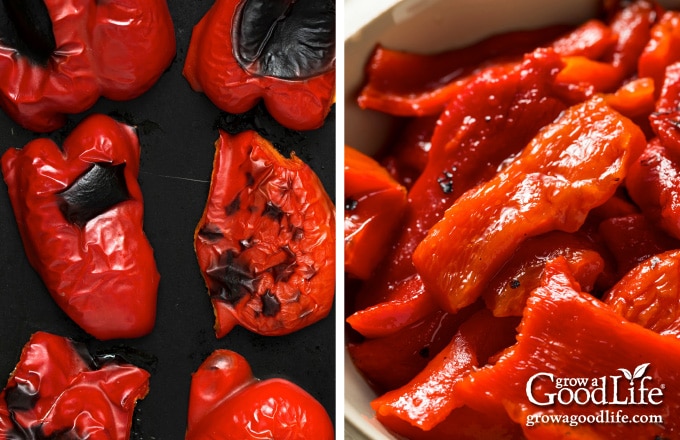
Step 3: Make the Marinating Brine
Heat about 1 tablespoon of the olive oil in a large saucepan over medium heat. Add the onions and garlic and sauté briefly until fragrant.
Add the remaining olive oil, vinegar, lemon juice, dried oregano, and sugar if using. Bring to a boil, and then reduce the heat to low, and keep warm until you are ready to use it.
Step 4: Fill the Jars and Process in a Water Bath Canner
Spread a kitchen towel on the counter. Use your jar lifter to remove a jar from canner, drain, and place on the towel. Keep the remaining jars in the canner so they stay hot.
Fill the jar with roasted peppers, leaving a 1/2-inch headspace. Give your marinating brine a good stir to be sure the oil is evenly distributed. Use your canning funnel and ladle to fill the jar about halfway with the brine.
Run your bubble popper through the jar to mix the peppers with the brine, and top off with more hot vinegar mixture leaving a 1/2-inch headspace. Run the bubble popper through the jars again to remove air bubbles, and adjust headspace if needed.
Wipe the rim with a damp towel to remove residue. Center a lid on the jar, place the band over the lid, and screw it on until fingertip tight. Place the jar back into the canner, and repeat with the rest of the jars.
Once the jars are in the canner, adjust the water level so it is covering the jars by two inches, bring the canner to a boil, and process the jars for the times indicated in the recipe below. Let the jars cool, test the seals, label and date the jars, and store in a cool, dark location for 12 to 18 months.
For best flavor, let the jars sit for at least 4 weeks before opening to allow the flavors to develop. Refrigerate after opening and use up within 2 weeks. Yields 8 half-pint or 4 pints.
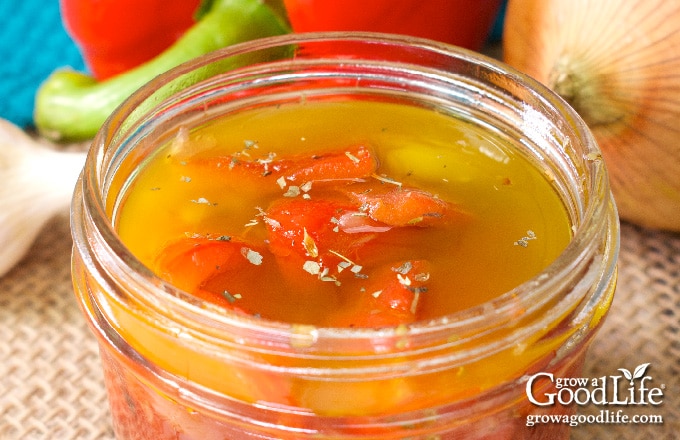
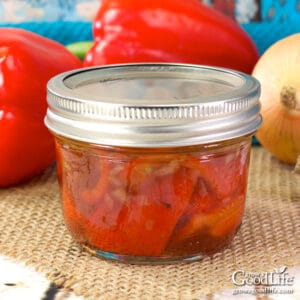
Marinated Roasted Red Peppers Canning Recipe
Ingredients
- 4 pounds red bell peppers (or any type of sweet peppers)
- 1 cup extra virgin olive oil
- 1/2 cup chopped onions
- 2 cloves garlic chopped
- 2 cups red wine vinegar (5% acidity)
- 1 cup bottled lemon juice
- 1 tablespoon dried oregano leaves
- 1 teaspoon sugar (optional for flavor)
Instructions
Prepare the canning equipment:
- Wash your jars, lids, screw bands, and canning tools in hot soapy water. Rinse well to remove all suds. Set aside to air dry on a clean kitchen towel.
- Place the jar rack into water bath canner, place jars in the canner, and add water to cover. Bring the canner to a simmer (180˚F) for 10 minutes, and keep the jars hot until you are ready to fill them.
Prepare your peppers:
- Rinse peppers well under clean, running water. Cut each pepper in half, and remove the stems, seeds, and ribs.
- Blister the skins of your peppers by grilling or broiling until the skins crack and separate from the flesh.
- Remove the peppers from the heat and place in a covered glass bowl to steam.
- Once the peppers are cool enough to handle, remove the skins, and tear or cut into pieces or strips. Divide the peeled roasted peppers evenly into piles to match the number of jars.
Make the marinating brine:
- Heat about 1 tablespoon of the olive oil in a large saucepan over medium heat. Add the onions and garlic and sauté briefly until fragrant, about 2 minutes.
- Add the remaining olive oil, vinegar, lemon juice, dried oregano, and sugar if using. Bring to a boil, and then reduce the heat to low. Keep warm until you are ready to use.
Can the peppers:
- Spread a kitchen towel on the counter. Use your jar lifter to remove a jar from canner, drain, and place on the towel. Keep the remaining jars in the canner so they stay hot.
- Fill the jar with roasted peppers, leaving a 1/2-inch headspace. Give your marinating brine a good stir to be sure the oil is evenly distributed. Use your canning funnel and ladle to fill the jar about halfway with the brine.
- Run your bubble popper through the jar to mix the peppers with the brine, and top off with more brine leaving a 1/2-inch headspace. Run the bubble popper through the jars again to remove air bubbles.
- Wipe the rim with a damp towel to remove residue. Center a lid on the jar, place the band over the lid, and screw it on until fingertip tight. Place the jar back into the canner, and repeat with the rest of the jars.
- Once jars are all in canner, adjust the water level so it is 2-inches over the tops of the jars.
- Cover the canner and bring the water to a rolling boil over medium-high heat. Once the water is boiling, process both half-pints and pints for 15 minutes at altitudes of less than 1,000 ft. Adjust processing time for your altitude if necessary (See Notes below).
- When processing time is complete, turn off heat, remove the cover by tilting lid away from you so that steam does not burn your face, and allow the canner to cool down and settle for 5 minutes.
- Spread a kitchen towel on the counter. Use a jar lifter to remove the jars one at a time from the canner. Keep the jars upright, and place them on the towel. Do not tighten ring bands or test the seals yet. Let the jars sit undisturbed for 12 to 24-hours to cool.
- After the jars have cooled for at least 12 hours, check to be sure lids have sealed by pushing on the center of the lid. The lid should not pop up. If the lid flexes up and down, it did not seal. Refrigerate the jar and use within 2 weeks.
- Remove the screw on bands and wash the jars. Label, date, and store the jars of marinated red bell peppers in a cool, dark location between 50 to 70 degrees F for 12 to 18 months.
- For best flavor, let the jars sit for at least 4 weeks before opening to allow the flavors to develop. Refrigerate after opening and use up within 2 weeks. Yields about 8 half-pint or 4 pints.
Notes
Nutrition
You May Also Like:
- Pickled Jalapenos Canning Recipe
- How to Pressure Can Green Chile Peppers
- Other Ways to Preserve Peppers
40+ Meals in a Jar Pressure Canning Recipes
In this eBook, you will find 50 pressure canning recipes, including 44 meals, along with homemade stocks and bone broths. Recipes include soups, stews, chilis, beans, beef, pork, and poultry. Explore the world of preserving delicious home-cooked meals for all seasons.

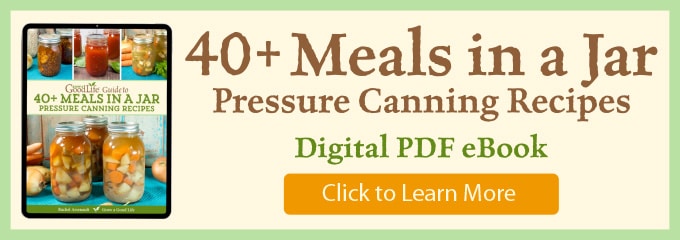
Can I leave the skins on the peppers? Do I have to peel them?
Kim, Yes, you can leave the skins on the peppers for this recipe. It is not a safety issue.
Can I leave the onions and spices out to have just plain peppers?
Kate, Yes, you can safely leave out the onions, garlic, and spices if you’d prefer plain peppers. Just be sure to keep the same proportions of olive oil, vinegar, and lemon juice as written — that’s what ensures safe canning. If you end up with extra marinade, it works nicely for quick refrigerator pickles.
Can I use more garlic?
Maggie, it isn’t safe to increase the amount of garlic in this recipe. The proportions of ingredients are tested to ensure the finished product has the proper acidity to prevent the growth of bacteria. If you’d like extra flavor, add fresh garlic when you open the jar instead.
This is my go to recipe. I’ve made it a few times with stellar results.
I think the red wine vinegar is key for me. The flavor of the peppers is so awesome. Of all the canning I do, this is the one I use most. Thank you SOOOO much for this recipe. It will be passed on to my grandkids. I like to print out recipes & put them in a binder.
🫑🌶️🤗
Jacki, Thank you so much for your kind words! It absolutely makes my day to hear that this recipe has become a favorite in your kitchen. I totally agree—red wine vinegar really brings out the flavor of the peppers!
Hi Rachel, This recipe look really yummy! Can frozen peppers be used? Jen
Hi Jen, thank you! This recipe is best with fresh peppers because freezing breaks down the cells that keep peppers crisp. Using frozen peppers may give a softer texture and can affect how well they absorb the pickling brine. Hope you enjoy the recipe with fresh peppers!
Can you use green bell peppers instead of red?
Michelle, Yes, you can. Check out the tips section for more ideas.
Is it important to weigh the peppers or could I use this approximate found in a google search?
“Three large or five medium sweet peppers (1 pound) equals 3 to 4 cups chopped”.
Melody, Yes, you can use the estimated amount.
I’ve done this recipe several times and have had great success. So yummy to have these on hand to throw into all sorts of recipes! My question is though I always end up with a large amount of brine leftover. When I pack the peppers in the jar I can only fit maybe 1/8-1/4 cup brine in each jar. Are these intended to be loosely packed?
Kate, It’s great to hear that you’ve had success with this recipe! When it comes to leftover brine, it’s not unusual in pickling recipes. The amount of brine required can vary depending on the size and density of the peppers. In this recipe, it’s perfectly fine to have some extra brine. It’s better to have a little too much brine than not enough. As for packing the peppers in the jars, you can pack them moderately tight, but they don’t need to be overly compressed. The important thing is that there’s enough brine to cover the peppers completely, which ensures they pickle evenly and are preserved safely. The leftover brine can be repurposed into a tasty marinade or salad dressing.
thx….I did wash them under hot water after they cooled the next day….two didn’t seal so I tested them…..good stuff…..thx for the recipe….